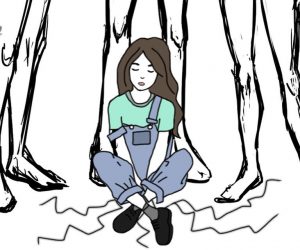To some degree I may not be the best one to be talking about this topic, as I put off ‘having that conversation’ right up until I had no choice. I first realised something was wrong early on in secondary school, but didn’t openly talk about, or seek help, until I was 18 and at college. I do remember trying to talk to a teacher at school about it at one stage, when I had become aware that the voices I was hearing were really not ‘normal’. But when I said that something was wrong, I was told that it was just everyday stress and that I’d have to learn to deal with it. To some degree I did take this advice, as I was scared to admit just how wrong things were, and that I wasn’t dealing with it all that well. People did just believe that I was suffering from bad anxiety and that I was putting too much pressure on myself at school.
I confessed to having voices when I was sat in front of a Psychiatrist, after doctors realised something wasn’t quite as it should be, and outright asked- I couldn’t hide it anymore.
However, if I could do over I would seek out help, be it professional or just my parents, right from the start. I got worse as the time went on, leading to a complete breakdown 8 years later-this all could have been avoided.
Mental health in general is not something to be ashamed of, it can happen to anyone at any time- but in the majority of cases it can be prevented from getting worse, to a stage that it leaves a mark on your life.
After my breakdown, I had to leave college and work, and was given a 3-year recovery time. I’m 18 months on, and only now starting to get back into part time work. This would not have been the case if I’d said something sooner.
In my experience, which is all I can really say about, you will find those people that judge you for your mental health, or your diagnosis; but you will find a lot more people that are caring and will spend the time to try and understand what you are going through. With some mental health symptoms, such as my voices, it’s hard for people to understand exactly, but that’s not always important. What’s important is that you have their support. And that is something a lot of people are willing to give, to be there for you to talk through the feelings that mental health gives you, to support you in tasks that your mental health makes difficult, and to just be there on the days that feel like too much.
I can’t claim to not understand why you would stay silent about your mental health, as I once felt I had to do the same. But I have learnt from experience the huge level of relief that talking about it can give you.
Don’t treat it as some big declaration, as it doesn’t have to be a big deal- you can tell someone over a coffee, just ask for help, support and care. If you are more worried, or think it’s too much to tell a loved one, go to the doctors, just say you need help, that your scared, or worried, or depressed, or that you are hearing voices. The likelihood is, they will pick it up from just how you are- I didn’t even have to say anything to my doctor for him to realise I was suffering with psychosis, he could just tell from the way I spoke and my body language.
Admitting I had my symptoms was the first step in my recovery, without doing that I’m sure I would still be on the downward spiral that I was in previously.
So just don’t be afraid, you are not alone, and there is people that can help- you just have to ask.
Alex is a media volunteer for Mind, the mental health charity and regularly speaks out about her experience. You can read more of her articles in her blog Angel Wings and Petticoats
See Mind’s website for more information on Psychosis and where you can go for support.

